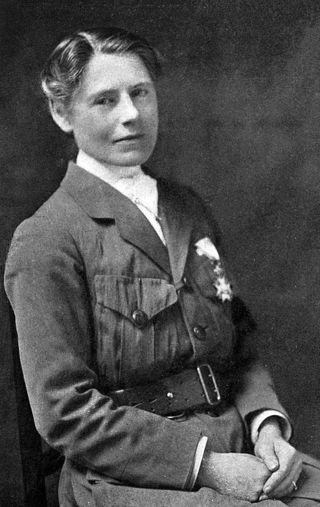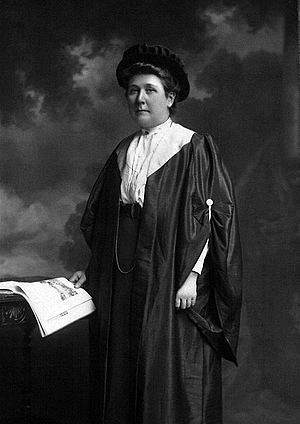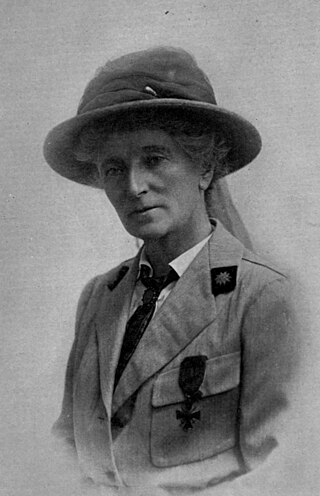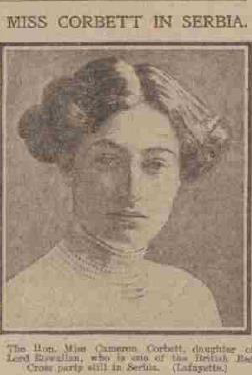
Eliza Maud "Elsie" Inglis was a Scottish medical doctor, surgeon, teacher, suffragist, and founder of the Scottish Women's Hospitals. She was the first woman to hold the Serbian Order of the White Eagle.

Dame Sarah Elizabeth Siddons Mair was a Scottish campaigner for women's education and women's suffrage. She was active in the Edinburgh Association for the University Education of Women and the Ladies' Edinburgh Debating Society, which she founded before she was 20.

Evelina Haverfield was a British suffragette and aid worker.

The Scottish Women's Hospitals for Foreign Services (SWH) was founded in 1914. It was led by Dr Elsie Inglis and provided nurses, doctors, ambulance drivers, cooks and orderlies. By the end of World War I, 14 medical units had been outfitted and sent to serve in Corsica, France, Malta, Romania, Russia, Salonika and Serbia.

Wilhelmina Hay Abbott, also known by the name "Elizabeth Abbott," was a Scottish suffragist, editor, and feminist lecturer, and wife of author George Frederick Abbott.

Alexandra Mary Chalmers Watson CBE,, known as Mona Chalmers Watson, was a British physician and head of the Women's Army Auxiliary Corps. The first woman to receive an MD from the University of Edinburgh, she helped found the Elsie Inglis Hospital for Women, was the first president of the Edinburgh Women's Citizen Association, a staff physician and later senior physician at the Edinburgh Hospital and Dispensary for Women and Children, and co-edited the Encyclopaedia Medica with her husband, Douglas Chalmers Watson. At the time of her death in 1936, she was president of the Medical Women's Federation, having been elected May 1935.
The Edinburgh National Society for Women's Suffrage was a leading group for women's rights in Scotland. It was one of the first three suffrage societies to be formed in Britain.

Grace Ross Cadell was a Scottish medical doctor and suffragist, and one of the first group of women to study medicine in Scotland and qualify.

Margaret (Madge) Neill Fraser usually known as Madge, was a Scottish First World War nurse and notable amateur golfer. She represented Scotland at international level every year from 1905 to 1914.
Helen, Lady Leslie Mackenzie CBE was a Scottish suffragist, pioneering social work educator and public health campaigner.

Frances Helen Melville, was a Scottish suffragist, advocate for higher education for women in Scotland, and one of the first women to matriculate at the University of Edinburgh in 1892. She was president of the British Federation of University Women from 1935 to 1942.

The Edinburgh College of Medicine for Women was established by Elsie Inglis and her father John Inglis. Elsie Inglis went on to become a leader in the suffrage movement and found the Scottish Women's Hospital organisation in World War I, but when she jointly founded the college she was still a medical student. Her father, John Inglis, had been a senior civil servant in India, where he had championed the cause of education for women. On his return to Edinburgh he became a supporter of medical education for women and used his influence to help establish the college. The college was founded in 1889 at a time when women were not admitted to university medical schools in the UK.

Katherine Mary Harley was a suffragist. In 1913 she proposed and organised the Great Pilgrimage on behalf of the National Union of Women's Suffrage Societies. During the First World War she helped to found and organise the Women's Emergency Corps.
Leah Leonora Leneman was a popular historian and cookery writer. She wrote about Scottish history including the struggle for women's suffrage.

The Orcadian Women's Suffrage Association was an organisation involved in campaigning for women’s suffrage, based in Orkney, Scotland.

Margaret Charlotte Davidson (1879–1978) was a modern languages teacher in Dornoch, Sutherland in the Scottish Highlands.
Mary Anne Baikie a Scottish suffragist who established the Orcadian Women's Suffrage Society (OWSS) and grew the membership and public interest in the debate, in the Orkney Isles, during the campaigns for Votes for Women.
Alice Low, (1877–1954) was a British suffragist, who spoke up for peaceful means of achieving women's rights to vote, and fairer laws, including reducing sweated labour. She was a leader in Edinburgh and Berwickshire National Union of Women's Suffrage Societies (NUWSS) and a touring speaker in the early twentieth century. She was also a lead member of Queen Mary's Army Auxiliary Corps. (QMAAC) in World War One and an amateur actress taking lead roles with the British Empire Shakespeare Society.

Elsie Cameron Corbett JP was a volunteer ambulance driver and major donor to the World War One Scottish Women's Hospital for Foreign Service in Serbia, She was a prisoner of war in 1916 and won medals from the Serbian and British governments. She was also a justice of the peace, a leading suffragist, temperance supporter, folklorist and diarist.
Bina Cursiter was a Scottish suffragist, who played a leading role in Orcadian Women's Suffrage Society, and helped to galvanise the organised women's movement in Orkney.














